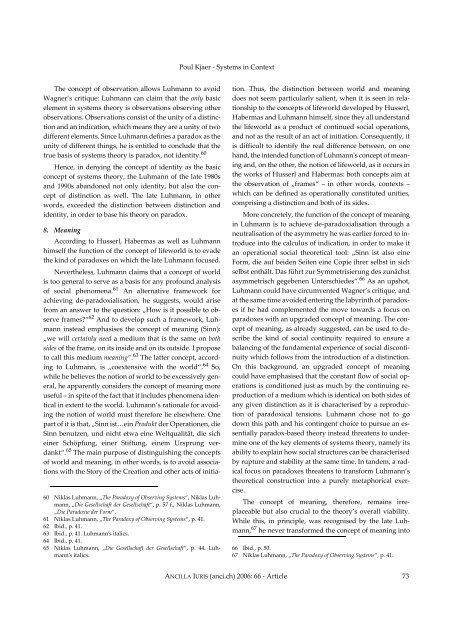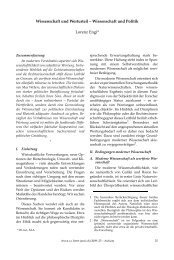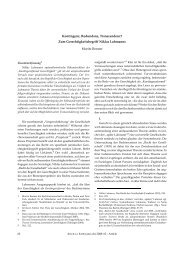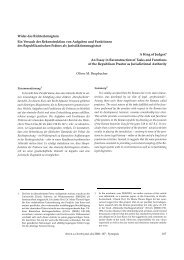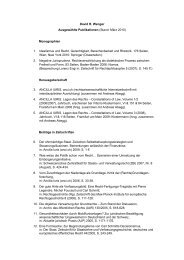On the outcome of the Habermas/Luhmann-debate
On the outcome of the Habermas/Luhmann-debate
On the outcome of the Habermas/Luhmann-debate
You also want an ePaper? Increase the reach of your titles
YUMPU automatically turns print PDFs into web optimized ePapers that Google loves.
The concept <strong>of</strong> observation allows <strong>Luhmann</strong> to avoid<br />
Wagner’s critique: <strong>Luhmann</strong> can claim that <strong>the</strong> only basic<br />
element in systems <strong>the</strong>ory is observations observing o<strong>the</strong>r<br />
observations. Observations consist <strong>of</strong> <strong>the</strong> unity <strong>of</strong> a distinc‐<br />
tion and an indication, which means <strong>the</strong>y are a unity <strong>of</strong> two<br />
different elements. Since <strong>Luhmann</strong> defines a paradox as <strong>the</strong><br />
unity <strong>of</strong> different things, he is entitled to conclude that <strong>the</strong><br />
true basis <strong>of</strong> systems <strong>the</strong>ory is paradox, not identity. 60<br />
Hence, in denying <strong>the</strong> concept <strong>of</strong> identity as <strong>the</strong> basic<br />
concept <strong>of</strong> systems <strong>the</strong>ory, <strong>the</strong> <strong>Luhmann</strong> <strong>of</strong> <strong>the</strong> late 1980s<br />
and 1990s abandoned not only identity, but also <strong>the</strong> con‐<br />
cept <strong>of</strong> distinction as well. The late <strong>Luhmann</strong>, in o<strong>the</strong>r<br />
words, exceeded <strong>the</strong> distinction between distinction and<br />
identity, in order to base his <strong>the</strong>ory on paradox.<br />
8. Meaning<br />
According to Husserl, <strong>Habermas</strong> as well as <strong>Luhmann</strong><br />
himself <strong>the</strong> function <strong>of</strong> <strong>the</strong> concept <strong>of</strong> lifeworld is to evade<br />
<strong>the</strong> kind <strong>of</strong> paradoxes on which <strong>the</strong> late <strong>Luhmann</strong> focused.<br />
Never<strong>the</strong>less, <strong>Luhmann</strong> claims that a concept <strong>of</strong> world<br />
is too general to serve as a basis for any pr<strong>of</strong>ound analysis<br />
<strong>of</strong> social phenomena. 61 An alternative framework for<br />
achieving de‐paradoxialisation, he suggests, would arise<br />
from an answer to <strong>the</strong> question: „How is it possible to ob‐<br />
serve frames?“ 62 And to develop such a framework, Luh‐<br />
mann instead emphasises <strong>the</strong> concept <strong>of</strong> meaning (Sinn):<br />
„we will certainly need a medium that is <strong>the</strong> same on both<br />
sides <strong>of</strong> <strong>the</strong> frame, on its inside and on its outside. I propose<br />
to call this medium meaning“. 63 The latter concept, accord‐<br />
ing to <strong>Luhmann</strong>, is „coextensive with <strong>the</strong> world“. 64 So,<br />
while he believes <strong>the</strong> notion <strong>of</strong> world to be excessively gen‐<br />
eral, he apparently considers <strong>the</strong> concept <strong>of</strong> meaning more<br />
useful – in spite <strong>of</strong> <strong>the</strong> fact that it includes phenomena iden‐<br />
tical in extent to <strong>the</strong> world. <strong>Luhmann</strong>’s rationale for avoid‐<br />
ing <strong>the</strong> notion <strong>of</strong> world must <strong>the</strong>refore lie elsewhere. <strong>On</strong>e<br />
part <strong>of</strong> it is that, „Sinn ist…ein Produkt der Operationen, die<br />
Sinn benutzen, und nicht etwa eine Weltqualität, die sich<br />
einer Schöpfung, einer Stiftung, einem Ursprung ver‐<br />
dankt“. 65 The main purpose <strong>of</strong> distinguishing <strong>the</strong> concepts<br />
<strong>of</strong> world and meaning, in o<strong>the</strong>r words, is to avoid associa‐<br />
tions with <strong>the</strong> Story <strong>of</strong> <strong>the</strong> Creation and o<strong>the</strong>r acts <strong>of</strong> initia‐<br />
60 Niklas <strong>Luhmann</strong>, „The Paradoxy <strong>of</strong> Observing Systems“, Niklas Luh‐<br />
mann, „Die Gesellschaft der Gesellschaft“, p. 57 f., Niklas <strong>Luhmann</strong>,<br />
„Die Paradoxie der Form“.<br />
61 Niklas <strong>Luhmann</strong>, „The Paradoxy <strong>of</strong> Observing Systems“, p. 41.<br />
62 Ibid., p. 41.<br />
63 Ibid., p. 41. <strong>Luhmann</strong>’s italics.<br />
64 Ibid., p. 41.<br />
65 Niklas <strong>Luhmann</strong>, „Die Gesellschaft der Gesellschaft“, p. 44. Luh‐<br />
mann’s italics.<br />
Poul Kjaer ‐ Systems in Context<br />
tion. Thus, <strong>the</strong> distinction between world and meaning<br />
does not seem particularly salient, when it is seen in rela‐<br />
tionship to <strong>the</strong> concepts <strong>of</strong> lifeworld developed by Husserl,<br />
<strong>Habermas</strong> and <strong>Luhmann</strong> himself, since <strong>the</strong>y all understand<br />
<strong>the</strong> lifeworld as a product <strong>of</strong> continued social operations,<br />
and not as <strong>the</strong> result <strong>of</strong> an act <strong>of</strong> initiation. Consequently, it<br />
is difficult to identify <strong>the</strong> real difference between, on one<br />
hand, <strong>the</strong> intended function <strong>of</strong> <strong>Luhmann</strong>ʹs concept <strong>of</strong> mean‐<br />
ing and, on <strong>the</strong> o<strong>the</strong>r, <strong>the</strong> notion <strong>of</strong> lifeworld, as it occurs in<br />
<strong>the</strong> works <strong>of</strong> Husserl and <strong>Habermas</strong>: both concepts aim at<br />
<strong>the</strong> observation <strong>of</strong> „frames“ – in o<strong>the</strong>r words, contexts –<br />
which can be defined as operationally constituted unities,<br />
comprising a distinction and both <strong>of</strong> its sides.<br />
More concretely, <strong>the</strong> function <strong>of</strong> <strong>the</strong> concept <strong>of</strong> meaning<br />
in <strong>Luhmann</strong> is to achieve de‐paradoxialisation through a<br />
neutralisation <strong>of</strong> <strong>the</strong> asymmetry he was earlier forced to in‐<br />
troduce into <strong>the</strong> calculus <strong>of</strong> indication, in order to make it<br />
an operational social <strong>the</strong>oretical tool: „Sinn ist also eine<br />
Form, die auf beiden Seiten eine Copie ihrer selbst in sich<br />
selbst enthält. Das führt zur Symmetrisierung des zunächst<br />
asymmetrisch gegebenen Unterschiedes“. 66 As an upshot,<br />
<strong>Luhmann</strong> could have circumvented Wagner’s critique, and<br />
at <strong>the</strong> same time avoided entering <strong>the</strong> labyrinth <strong>of</strong> paradox‐<br />
es if he had complemented <strong>the</strong> move towards a focus on<br />
paradoxes with an upgraded concept <strong>of</strong> meaning. The con‐<br />
cept <strong>of</strong> meaning, as already suggested, can be used to de‐<br />
scribe <strong>the</strong> kind <strong>of</strong> social continuity required to ensure a<br />
balancing <strong>of</strong> <strong>the</strong> fundamental experience <strong>of</strong> social disconti‐<br />
nuity which follows from <strong>the</strong> introduction <strong>of</strong> a distinction.<br />
<strong>On</strong> this background, an upgraded concept <strong>of</strong> meaning<br />
could have emphasised that <strong>the</strong> constant flow <strong>of</strong> social op‐<br />
erations is conditioned just as much by <strong>the</strong> continuing re‐<br />
production <strong>of</strong> a medium which is identical on both sides <strong>of</strong><br />
any given distinction as it is characterised by a reproduc‐<br />
tion <strong>of</strong> paradoxical tensions. <strong>Luhmann</strong> chose not to go<br />
down this path and his contingent choice to pursue an es‐<br />
sentially paradox‐based <strong>the</strong>ory instead threatens to under‐<br />
mine one <strong>of</strong> <strong>the</strong> key elements <strong>of</strong> systems <strong>the</strong>ory, namely its<br />
ability to explain how social structures can be characterised<br />
by rupture and stability at <strong>the</strong> same time. In tandem, a rad‐<br />
ical focus on paradoxes threatens to transform <strong>Luhmann</strong>’s<br />
<strong>the</strong>oretical construction into a purely metaphorical exer‐<br />
cise.<br />
The concept <strong>of</strong> meaning, <strong>the</strong>refore, remains irre‐<br />
placeable but also crucial to <strong>the</strong> <strong>the</strong>ory’s overall viability.<br />
While this, in principle, was recognised by <strong>the</strong> late Luh‐<br />
mann, 67 he never transformed <strong>the</strong> concept <strong>of</strong> meaning into<br />
66 Ibid., p. 50.<br />
67 Niklas <strong>Luhmann</strong>, „The Paradoxy <strong>of</strong> Observing Systems“, p. 41.<br />
ANCILLA IURIS (anci.ch) 2006: 66 ‐ Article 73


